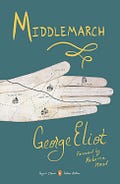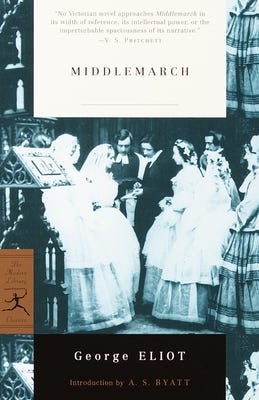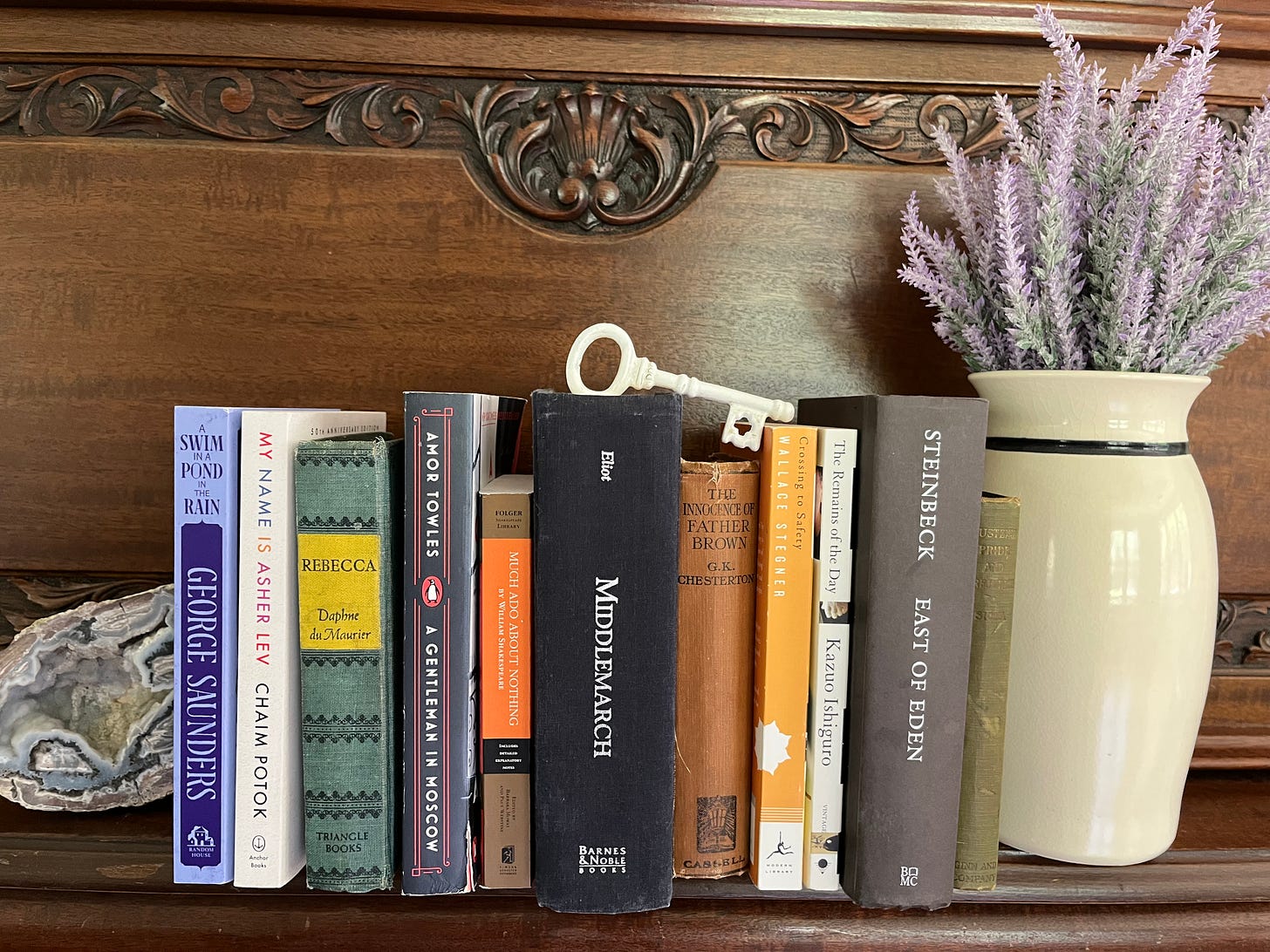Happy Saturday Readers,
I hope that you are having a relaxing morning on this chilly day! I am getting this out much later than planned because toddlers with ear infections do not approve of mommies on computers. But alas, it is good for me to have my perfect plans ruined by toddlers to remind me that I am actually not in control of the universe. Humility is taught to me little by little in the form of very small people. I am hopefully optimistic that I will get back to my relaxing literary Saturday by nap time. And anyone else having that kind of morning, I wish you a similar reset as well!
Now, onto Middlemarch! I did some calculating and realized that if I wanted to thoughtfully read Middlemarch I should probably get started. If I read a chapter or two a day I will make it with a few days to spare. I strongly encourage others to adopt this reading plan because most chapters are actually pretty short so it is very doable. This is also a novel full of rich characters and a lot to meditate upon, so reading it slowly has proven beneficial to me. My general plan for the newsletter for these two months is to post a few thoughts from each chapter I’ve read that week and then maybe a few other resources to supplement your reading or about George Eliot. I hope this is helpful and makes you love Middlemarch more.
Middlemarch Chapter Musings
1-2
In these first two chapters we meet Dorothea and Celia as well as Chettam and Cassubon. The epitaph for chapter 2 is a quote from Don Quixote referencing his inability to see things as they are. Dorothea sees Cassubon as “glittering” when he is anything but that. And then at the end of the chapter she can’t see the jewels for what they are (which should be actually glittering). Also to be noted is Celia saying that Dorothea “likes giving up,” and Dorothea’s response only proves that she doesn’t know herself. I ended this chapter thinking that even though Dorothea has some “great souled” qualities that we are to trust Celia in her “common sense” more.
“Women were expected to have weak opinions; but the safeguard of society and of domestic life was, that opinions were not acted on. Sane people did what their neighbors did, so that is any lunatics were at large, one might know and avoid them.”
“stifled in the depths of her heart was the feeling that her sister was too religious for family comfort. Notions and scruples were like spilt needles, making one afraid of treading, or sitting down, or even eating.”
3
In chapter 3 Dorothea is seeing herself reflected in Cassubon and therefore is the only one to see him as attractive. Which is funny because she herself is actually attractive. The contrast here is very interesting. We also keep hearing about Cassubon’s “unfinished” work, which is to “reconcile complete knowledge with devoted piety.” How appropriate that Dorothea would seek that. But also how interesting that it is emphasized how unfinished it is (and it seems implied that he will never finish…because how could anyone finish such a task?). I also enjoyed Dorothea’s thoughts about her and Cassubon’s future marriage…
“There would be nothing trivial about our lives. Everyday-things would mean the greatest things.”
She says this thinking about helping Cassubon in his great unfinished work, but I couldn’t help but think of G.K. Chesterton’s famous quote…
“The most extraordinary thing in the world is an ordinary man and an ordinary woman and their ordinary children.”
I also enjoyed the conversation about the puppy. Dorothea admits that she is short sighted (more blindness imagery) and wouldn’t be able to see the puppy before stepping on it. I’m pretty sure we should connect Chettam with the puppy (she is about to step on him too and not see it).
“It is difficult to say whether there was or was not a little willfulness in her continuing blind.”
4
Now we start seeing that she is at least a little willful in her blindness when Celia tells her of Sir James’ feelings…
“details asleep in her memory were now awakened to confirm the unwelcome revelation.”
We also have more evidence that Celia is the one seeing rightly (and that Chettam is the puppy who is about to be stomped on…
“you went on as you always do, never looking just where you are, and treading in the wrong place. You always see what nobody else sees….Yet you never see what is quite plain.”
In the prologue we were given a description of what great souled women will look like to society and I think we are supposed to connect this with Dorothea and not dislike her. But we should be looking to what will make her into a more mature woman in the story. What Dorothea says about suffering in marriage and not seeing marriage as a personal ease makes me think of what C.S. Lewis says in The Four Loves about choosing a spouse: that of course there will be sanctifying suffering involved in marriage, but choosing a spouse for that reason would be foolish. I cannot finish my reflections on this chapter without mentioning that we keep getting references to Cassubon’s eyes being weak or hurt. This makes me think of the blindness that we see in Dorothea, but also the in the Bible people dying are referred to as their “eyes growing dim.”
5
This chapter is when we get the letters between Cassubon and Dorothea proposing and accepting marriage. Reading what Cassubon actually writes in contrast with what Dorothea reads is very sadly funny. She hears and reads what she wants to, not what he actually says. It reminds me of Marianne, in Sense and Sensibility (December 2020), convincing herself that she and Willoughby are engaged when he has said nothing of the sort. I also thought it was interesting that her hand was “unusually uncertain” when she writes back and she has to write the answer 3 times. Is her hand betraying her? I am still finding Celia to be the “reliable narrator” and very likable, which I assume Eliot is doing purposely so that we have a character through which we can see the “reality” of the story. But in all of this I find myself annoyed with and relating to Dorothea. This seems to be Eliot showing her talent as a writer or intricate characters.
6
What are we to think of Mrs. Cadwallader? She is ridiculous and rude, but also says a lot of things that I am inclined to agree with. I think she is just a busy body, which doesn’t make her wrong. She reminds me of Mrs. Rachel Lynde, in Anne of Green Gables (April 2021), who is simultaneously awful and hilarious and likable (mostly). Time will tell if Mrs. Cadwallader is similar. It is interesting to think of Dorothea and her in contrast to each other. Dorothea is way more likable, but wrong…whereas Mrs. Cadwallader is unlikeable, but seems to be right a lot. This also takes us back to the first chapter when Dorothea thinks of the Rector and his wife as being “the world” that she is rebelling against. Also I appreciate Celia’s statement about marriage…
“I don’t think it can be nice to marry a man with a great soul.”
7
Mr. Cassubon’s thoughts on his inability to feel as he ought about Dorothea are so interesting. Like Dorothea he attributes his own lack to other people exaggerating or being wrong, instead of assuming there may be something wrong with him. Dorothea’s thoughts about knowing more leading to trusting her opinions more is so interesting. Her and Cassubon are both so reasonable, but it is hard to read because we as readers can see where they fall short. I also found this quote so interesting…
“To have in general but little feeling, seems the only security against feeling too much on any particular occasion.”
This quote in contrast with C.S. Lewis’ wisdom from The Four Loves on the same subject is jarring…
“To love at all is to be vulnerable. Love anything and your heart will be wrung and possibly broken. If you want to make sure of keeping it intact you must give it to no one, not even an animal. Wrap it carefully round with hobbies and little luxuries; avoid all entanglements. Lock it up safe in the casket or coffin of your selfishness. But in that casket, safe, dark, motionless, airless, it will change. It will not be broken; it will become unbreakable, impenetrable, irredeemable. To love is to be vulnerable.”
Dorothea and Cassubon’s dislike for everyday music seems fitting to their personalities and maybe an objective correlative for their habit of ignoring the ordinary as having any importance.
8
This chapter has me liking Chettam more and more. Him and Celia seem to be a great match. Is this what we’re supposed to be wanting at this point? Cheetah’s conversation with the Rector about Cassubon and Dorothea is very funny…
“Has he got any heart?” -Chettam
"well, yes, I don’t mean of the melting sort.”- Rector
I am also appreciating how well Eliot is drawing her characters for us. I couldn’t help laughing at Cassubon’s blood being made up of semicolons and parentheses. I am wondering at the end of this chapter if we will see a real friendship spring up between Dorothea and Chettam….and I hope so!
If you are reading and have any thoughts to share please comment on this post or share on the slack. I would love to hear your thoughts as we meander through this long book over the next two months!
Podcasts and Audiobooks
*I haven’t listened to all, but wanted to share some companions if you’re the podcast sort
A Delectable Education is a Charlotte Mason homeschooling podcast. They do a book club every year and a few years ago they did one on Middlemarch. They only have one episode, but I’m sure they have helpful and interesting insights.
There is also a series from the Novel Pairings podcast. I had never heard of them, but they read a lot of good books and seem likable from what I’ve listened to.
There is a free Audible version of the book if you are feeling overwhelmed at the prospect of reading 800 pages in two months. I am also sure there are multiple versions on Librivox (and I heard version 2 is the best from a fellow reader).
Throwback to Old Books
I came across a couple of funny quotes on past books or authors we have read and wanted to share them with you….enjoy!
Shakespeare (From January 2023 and 2024)
“…why have so many people managed to convince themselves that Shakespeare did not write Shakespeare’s plays, when there is not a atom of evidence that anybody else did? Apparently because they feel that poetry must be written out of personal experience, and that Shakespeare didn’t have enough experience of the right kind. But Shakespeare’s plays weren’t produced by his experience: they were produced by imagination, and the way to develop the imagination is to read a good book or two. As for us, we can’t speak or think or comprehend even our own experience except within the limits of our own power over words, and those limits have been established for us by our great writers.”
-Northop Frye (The Educated Imagination)
P.G. Wodehouse (from July 2023)
“A certain critic -- for such men, I regret to say, do exist -- made the nasty remark about my last novel that it contained 'all the old Wodehouse characters under different names.' He has probably by now been eaten by bears, like the children who made mock of the prophet Elisha: but if he still survives he will not be able to make a similar charge against Summer Lightning. With my superior intelligence, I have out-generalled the man this time by putting in all the old Wodehouse characters under the same names. Pretty silly it will make him feel, I rather fancy.”
(Close Reads just finished up a series on Summer Lightning and it was so enjoyable to read and listen to them laugh and be insightful about such a light book to open up the reading year!)
And that is all I have for you this morning (and now we are into the afternoon). I wish you many long, uninterrupted reading sessions (if such things exist) over the rest of the weekend. I plan to “watch” a lot of sportsball with a book in my lap and hope you can do the same. I will be back next week with some more chapter musings on Middlemarch. I hope you enjoy!
Enjoy your reading till we meet again!
“What we’d never see except in a book is often what we go to books to find.”
-Northrop Frye (The Educated Imagination)
A Few Reminders
Next up for Literature Book Club is The Innocence of Father Brown for April and then Crossing to Safety for May.
If you found your way here and are not part of an in person book club, welcome! We would love you to read along with us. But, in person literary community is a beautiful thing. So please contact me if you’d like to join or start a group!
If you are part of a group, but you’re not on our Slack page, please contact me. That is where people share thoughts and logistics for each in person group.
Book lists from previous years can be found here.
We are now on Facebook, Instagram, and Twitter (with links to Substack) in order to hopefully spread the reading life to more people...if you want to like or share with any friends that want to start their own groups (or follow along virtually) please do!
*As always, some of the links are affiliate links. The few cents(literally) earned with each purchase you make after clicking links (at no extra cost to you) go toward the time and effort it takes to keep Literature Book Club running and I appreciate it!







Thank you for your reflections! I am only reading Middlemarch now (unfortunately I didn’t know your Substack back in January..) and I’m half way through the book. I’m loving it, but I did struggle at the beginning. I think I am at the point now where I just want to keep reading and I can’t put it down 😅